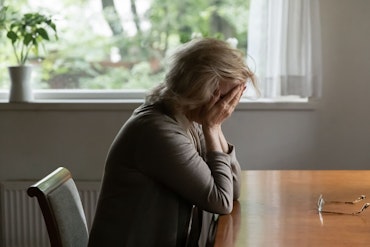Bill Shorten attends event in support of the two Australians who die of this disease every day
How older age could increase your risk of this disease
![<p>Understanding more about motor neurone disease means you can better support people affected by this disease. [Source: Shutterstock]</p>](https://agedcareguide-assets.imgix.net/news/articles/wp/doctortalking2406.jpg?fm=pjpg&format=auto&w=550&q=65)
Understanding more about motor neurone disease means you can better support people affected by this disease. [Source: Shutterstock]
Key points:
- Motor neurone disease is more likely to affect Australians over 50 years old than younger age groups, according to Motor Neurone Disease Australia
- Motor Neurone Disease Australia is celebrating its 30th year of supporting people with MND and their families
- Life expectancy after MND can vary between people but the average is around two to three years after receiving the diagnosis
Every day, motor neurone disease is diagnosed in two Australians and kills another two, according to Motor Neurone Disease Australia. MND is more likely to affect Australians over the age of 50 years compared to younger age groups.
Since 1993, Motor Neurone Disease Australia has been supporting people with MND and their families as the national peak body of state organisations for MND.
The 30th anniversary of Motor Neurone Disease Australia is being recognised this week, with lifetime awards being given to notable contributors to the organisation.
Despite MND affecting up to 2,300 Australians at any one time according to Motor Neurone Disease Australia, many Australians do not know much about the disease until it affects them or someone they know.
Signs and symptoms of MND can include slurring of speech, difficulty walking and problems with hand grip which may result from weakening muscles.
Different forms of MND include amyotrophic lateral sclerosis, progressive bulbar palsy and progressive muscular atrophy. After receiving an MND diagnosis, the average life expectancy is between two to three years, according to Motor Neurone Disease Australia.
With a disease that can cause rapid decline in a person’s ability to look after themselves, providing support and advocacy for people with MND can make a big difference in their lives.
Motor Neurone Disease Australia’s ceremony at Parliament House in Canberra will involve awarding lifetime achievement recognition to ‘people who have made a significant contribution to the MND landscape in the last 30 years.’
Award recipients include MND neurologist Dominic Rowe, 2024 WA Australian of the Year Professor Samar Aoun and FightMND founder and footballer Neale Daniher.
MND Australia Board President Andrew Danson expressed the importance of MND Australia’s work in supporting people with MND.
“We’ve achieved a lot in 30 years. Together with the state MND associations, we have supported thousands of Australians with MND, as well as their families, friends and carers,” he said.
“We’ve also invested $50 million dollars in research, funding over 500 research projects in Australia.”
However, Mr Danson explained that despite making a difference in the lives of people affected by MND over the last 30 years, improving access to treatments is required.
“[…] There are no effective treatments — people with MND lose the ability to walk, talk, swallow and breathe and then they die. It truly is a dreadful disease,” said Mr Danson.
“When new treatments become available, we need to fast-track the approval process here in Australia — people with MND just don’t have time to wait.
“We’re calling for aged care [providers] to provide disability supports to people with MND aged over 65 at a comparable level to the NDIS and we need to ensure the NDIS remains strong and meets the complex needs of people with MND,” said Mr Danson.
In addition to the awards ceremony at this event, Motor Neurone Disease Australia will bring forth a six-point plan for discussion to increase support for people living with MND.
Attendees expected at the Motor Neurone Disease Australia awards ceremony include the Minister for the NDIS the Hon Bill Shorten and Assistant Minister for Health and Aged Care the Hon Ged Kearney.
Mr Danson expressed optimism when discussing the presence of the event speakers at the awards ceremony and how this event could positively impact the future of people with MND.
“We look forward to hearing from the ministers and other parliamentarians about their response to our six-point plan and other initiatives that could make a real difference in the lives of people impacted by MND,” said Mr Danson.
While the causes of many MND cases are unknown, up to 15 percent of cases may be a result of genetic mutation, as per information available on the Motor Neurone Disease Australia website.
The Australian Government has pledged two million dollars in 2024 – 2025 to ‘support innovative, safe, rigorous and high-quality MND research projects.’
Additionally, the Big Freeze campaign, organised by FightMND, has raised more than $16 million dollars for MND research. This is the campaign’s tenth consecutive year and aims to raise awareness and funds to improve the lives of people with MND. Sign up and get involved on the official FightMND website.
How much do you know about motor neurone disease?
Let the team at Talking Aged Care know on social media.
For more information and news in the aged care industry, subscribe to our free newsletter.
Relevant content:
First-of-its-kind charity launches to support older victims of cybercrime
Why you may be asked to ‘draw a clock’ at the hospital
Up to 94 percent of older Australians aren’t meeting these health recommendations — are you?
























Comments